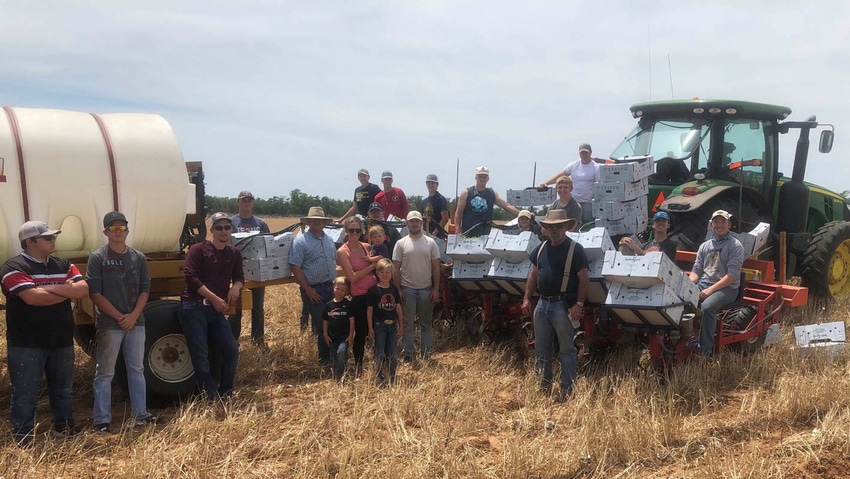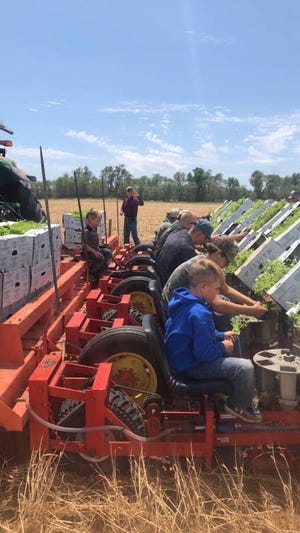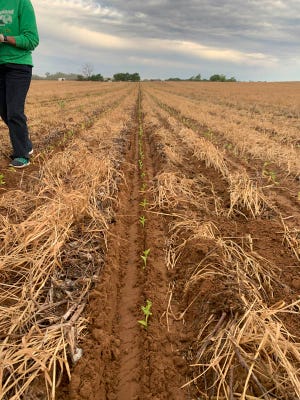
Last year, as Mark Thornbrough began running 2020 production numbers, he knew he'd plant his traditional wheat and cotton, even though, like most commodities, the profit margin was slim.
He also considered other commodities with greater profit potential. Thornbrough decided to try chile peppers.
"I knew nothing about growing peppers," admits Thornbrough, who farms near Granite, Oklahoma. "I had seen guys around the Hydro area plant them and visited with them a couple of times last year, but during pepper harvest, I was stripping cotton, so I didn't get to see that."
But before he planted a pepper he needed a transplanter, which he purchased "from up north" and had shipped to Granite. "I had to figure out how to run the thing," he says.
Next, he needed at least 16 people to run the transplanter over 60 acres. "I don’t even know 16 people," Thornbrough says.
But timing, a pandemic and an ensuing school shutdown quickly resolved that issue.
"The blessing of COVID, if there is one, was the local ag teacher, Kyle Norvell, had been working for me after school, so he brought FFA kids out to transplant the peppers."
FFA
Norvell, in his seventh year as a high school ag teacher, fifth year at Granite, says Thornbrough periodically calls him to see if he has students available to help on the farm. But Norvell also likes to work for Thornbrough.
 (Mark Thornbrough's transplant crew. Photo courtesy of Mark Thornbrough)
(Mark Thornbrough's transplant crew. Photo courtesy of Mark Thornbrough)
"It keeps me up to date on what's going on in the world of farming. I'm not just teaching ag, I'm actually involved and understanding how things are changing.
"Mark stays up to date on things, his equipment and techniques. That's the kind of person I want to learn from so I can pass it along to my students."
As planting season approached, Norvell accompanied Thornbrough to Hydro where they observed a crew transplanting peppers. "Mark asked if I thought I could round up enough kids to get the job done. With COVID going on we didn't know if parents would allow them to come out or not."
But because the transplant job was outdoors and proper precautions were taken, Norvell managed to recruit FFA students from Granite along with teens from Tipton and Altus FFA and a couple of homeschool students. Thornbrough's oldest son, John, helped as well.
"It was awesome," Norvell says. "It gave them hands-on experience, which doesn't happen a lot in Oklahoma; you don't see a lot of chilies raised here. But it was also a lot harder than that other crew made it look. The crew we watched ran about 1.2 miles per hour. I think we ran like .75 the whole time. It was quite a deal."
As Norvell and his crew transplanted 750,000 peppers, Thornbrough drove the tractor ahead of them clearing cotton stalks.
"The experience gave the students a firsthand look at how the agricultural industry works and how labor-intensive certain crops are. Chile peppers are a lot of work."
 (Students transplant 750,000 chile peppers on Mark Thornbrough's farm. This is Thornbrough's first year to produce the peppers. Photo courtesy of Mark Thornbrough)
(Students transplant 750,000 chile peppers on Mark Thornbrough's farm. This is Thornbrough's first year to produce the peppers. Photo courtesy of Mark Thornbrough)
Along with earning a paycheck, the students also enjoyed building connections with other students, working with younger and older peers, and people they'd never met. "We didn't just have high schoolers, we had a couple of college kids, including last year's Southwest District Vice President Bryce Wagh."
The job also provided an opportunity for the students to earn their SAE, Supervised Agricultural Experience, which is not easily attained if they don't show livestock or live on a farm, says Norvell. "It was a fantastic deal. I really enjoyed it and the kids did, too."
Thornbrough agrees. "They did a great job. I'm super proud of them."
Read more about:
Chile PeppersAbout the Author(s)
You May Also Like






